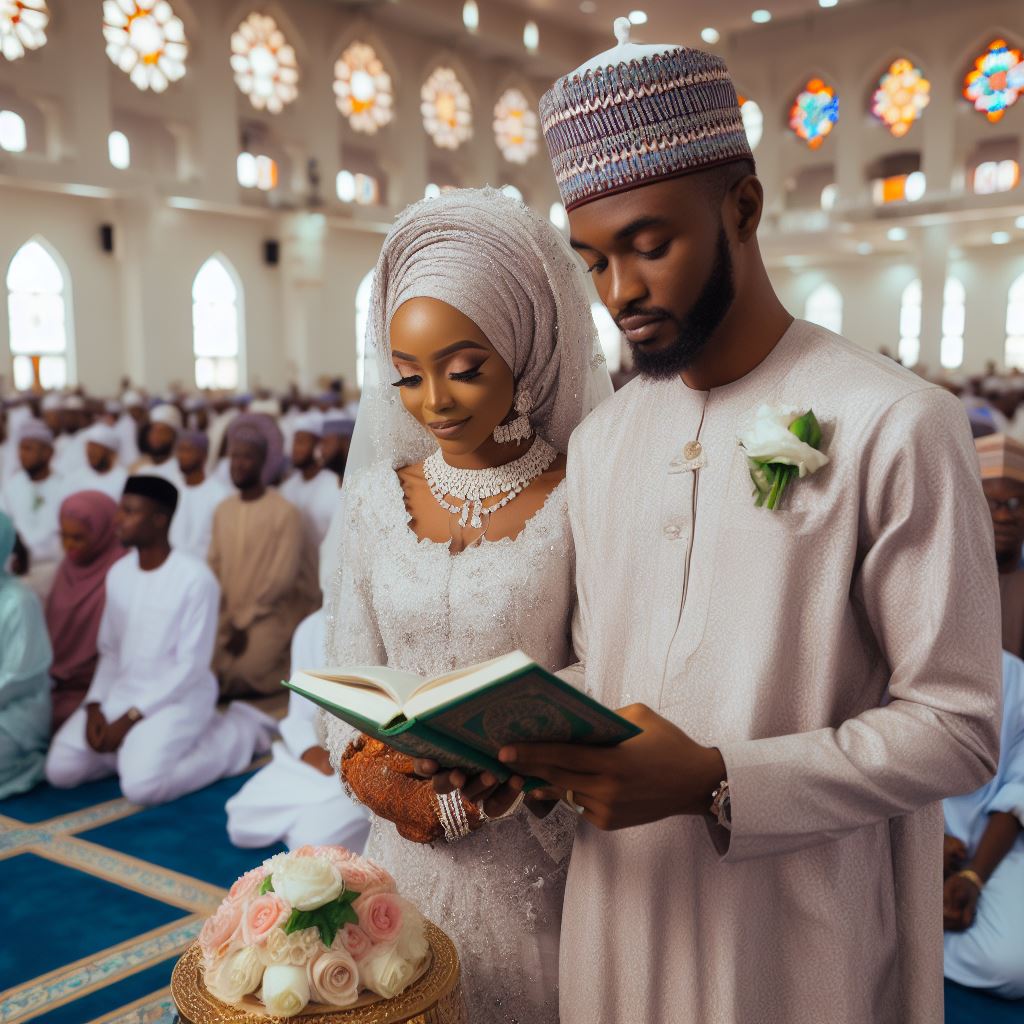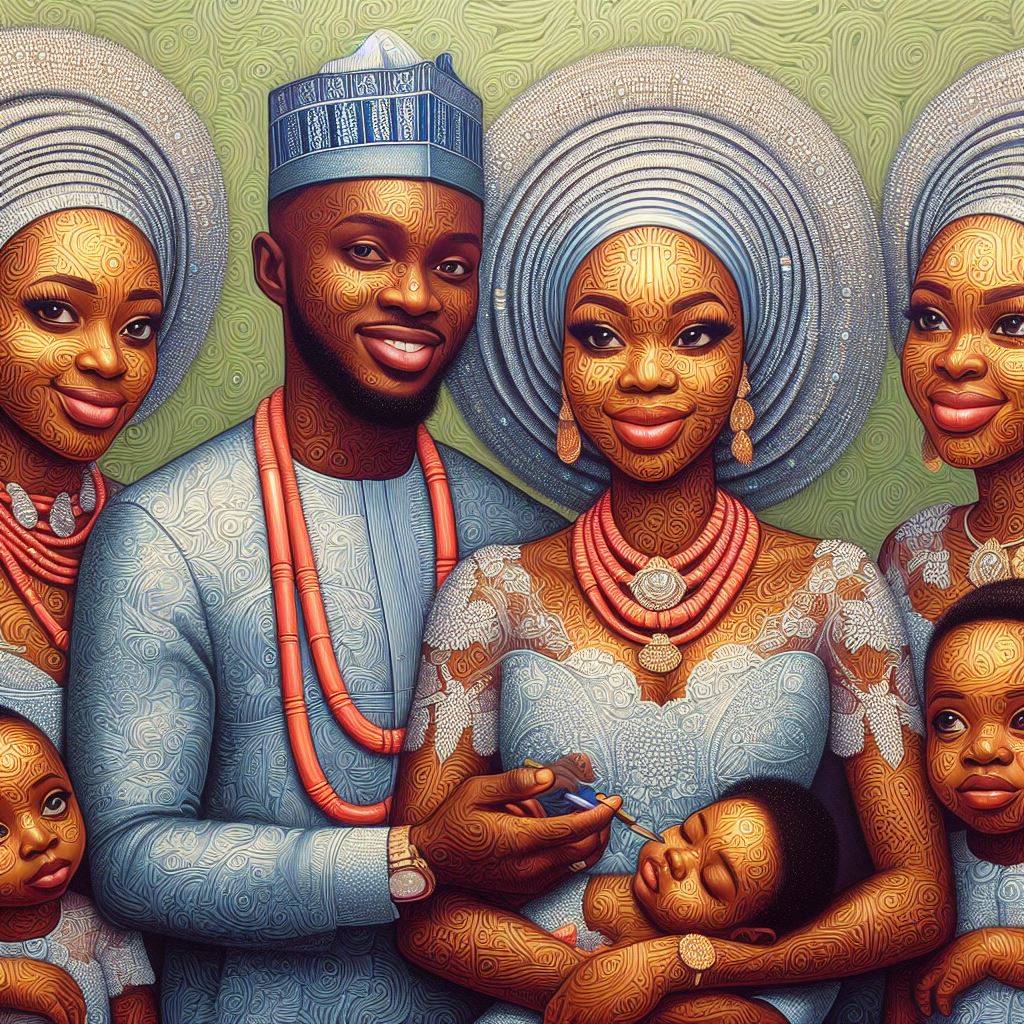Introduction
Nigerian marriages have unique characteristics and cultural significance, influenced significantly by the extended family.
- Extended family includes relatives beyond the nuclear family.
- It plays a crucial role in Nigerian marriages.
- Marriage is the union of not just individuals but two families.
- Extended family comprises grandparents, aunts, uncles, and cousins.
In Nigerian culture:
- The extended family provides support, guidance, and a sense of belonging.
- Actively involved in decision-making, including spouse choice, conflict resolution.
- Belief that individual well-being is linked to family harmony.
Financial stability is a contribution of the extended family:
- They provide financial support for weddings, dowries, and housing.
- This support helps couples navigate marital challenges and provides a safety net.
However, involvement can lead to conflicts and interference:
- Excessive in-law interference can strain relationships.
- Balancing expectations of the extended family while maintaining a healthy marital relationship can be challenging.
Upcoming section explore the impact more deeply:
- Discuss specific challenges, solutions, and strategies.
- Aim to maintain a harmonious balance between the nuclear and extended family.
By examining these issues, we can gain a deeper understanding of Nigerian marriages’ dynamics and strengthen familial ties.
The Impact of Extended Family in Nigerian Marriages
Role of extended family in decision-making
- Involvement in choosing a spouse
- Influence on major life decisions
Financial obligations and support
- Financial contributions from extended family members
- Expectations and pressures related to financial support
Interference and conflict
- Intrusion into marital matters
- Challenges in maintaining boundaries
- Conflicts arising from differing opinions and values
In Nigerian culture, the extended family significantly influences marriages through decision-making, financial support, and potential conflicts.
Decision-making
- The extended family aids in spouse selection.
- They influence major life decisions.
- Conflict may arise from differing desires.
Financial support
- Extended family often financially contributes to weddings, housing, and other milestones.
- This support can lead to expectations.
- Fulfilling these expectations can strain the marital relationship.
Conflict and interference
- Extended family involvement can lead to interference in marital matters.
- This intrusion disrupts marital harmony.
- Setting clear boundaries is essential.
- Differing opinions and values can spark disputes.
- Compromises and open communication are vital for a harmonious relationship.
In general, the extended family profoundly impacts Nigerian marriages.
Understanding and managing this influence is essential for a harmonious marital relationship.
Read: Top 10 Marriage Books Every Nigerian Couple Should Read

Read: Overcoming Envy: A Guide for Couples in Nigeria to Thrive
Challenges Arising from Extended Family in Nigerian Marriages
Communication difficulties
- Misunderstandings due to cultural differences
- Lack of open communication channels
Communication is a vital aspect of any relationship, especially in marriage.
However, Nigerian marriages often face challenges with communication due to the involvement of extended family members.
One significant issue is the presence of cultural differences that can lead to misunderstandings.
For example, certain actions or words that may seem harmless in one culture can be seen as offensive in another.
Without proper understanding and effective communication, conflicts can arise.
Another communication challenge arises from the lack of open channels. In Nigerian marriages, extended family members often play a crucial role in decision-making processes.
Spouses may find it challenging to communicate their thoughts and feelings openly, fearing criticism or judgment.
This lack of open communication can lead to misunderstandings and create a divide between the couple.
Unrealistic expectations and pressure
- Pressure to conform to societal norms and traditions
- Unrealistic expectations of the role of spouses within the extended family
Extended family involvement in Nigerian marriages often brings along unrealistic expectations and pressure.
Society imposes certain norms and traditions that couples are expected to adhere to.
This pressure to conform can result in stress and tension within the marriage.
Moreover, the extended family may have specific expectations regarding the roles of spouses within the family structure.
These expectations may not align with the couple’s desires or capabilities, leading to conflicts and dissatisfaction.
Conflict resolution issues
- Difficulty in resolving conflicts involving extended family members
- Struggling to find a balance between spouse and extended family’s interests
Effective conflict resolution is essential for a healthy marriage.
However, Nigerian couples often encounter difficulties in resolving conflicts that involve extended family members.
Conflicts may arise due to differences in opinions or interference from family members.
Resolving these conflicts becomes challenging as finding a middle ground becomes increasingly complex.
Furthermore, striking a balance between the interests of the spouse and the extended family can be a daunting task.
Couples may face pressure to prioritize the demands of the extended family, neglecting their own needs and aspirations.
This imbalance can lead to resentment and dissatisfaction within the marriage.
Nigerian marriages face various challenges arising from the involvement of extended family members.
Communication difficulties, including misunderstandings due to cultural differences and lack of open communication channels, hinder effective communication between spouses.
Unrealistic expectations and pressure to conform to societal norms and traditions add to the strain on the marriage.
Conflict resolution becomes a challenge when extended family members are involved, and finding a balance between the interests of the spouse and the extended family can be a struggle.
To maintain healthy and thriving relationships, couples must work together to address these challenges and find suitable solutions that prioritize their happiness and well-being.
Read: Cultural Importance of Marriage Papers in Nigerian Society
Solutions for Dealing with the Impact of Extended Family
Effective communication strategies
- Open and honest communication with extended family members is crucial.
- Building trust and understanding through dialogue can help to resolve conflicts.
Establishing boundaries
- Setting clear boundaries and expectations with extended family is important.
- Discussing and negotiating roles and responsibilities can prevent misunderstandings.
Seeking professional help
- Considering counseling or therapy to navigate family dynamics and address issues.
- Guidance from experts in managing conflicts and maintaining a healthy marital relationship can be beneficial.
Extended family members often play a significant role in Nigerian marriages.
While their involvement can bring many benefits, it can also have negative impacts if not managed effectively.
In this section, we will discuss some solutions for dealing with the impact of extended family.
Effective communication strategies
Open and honest communication with extended family members is crucial for maintaining a healthy marriage.
It is important to address any issues or concerns openly and respectfully.
By sharing thoughts, feelings, and expectations, couples can work together to find solutions and prevent misunderstandings.
Building trust and understanding through dialogue can help to resolve conflicts and strengthen relationships between the couple and their extended family.
Establishing boundaries
To prevent excessive interference and maintain autonomy, setting clear boundaries and expectations with extended family is essential.
Couples should openly discuss their limits and define what is acceptable and what is not.
By doing so, they can ensure that their marriage retains its independence and that everyone respects each other’s space.
Discussing and negotiating roles and responsibilities can also help to minimize conflicts and promote harmony within the extended family unit.
Seeking professional help
When extended family impact overwhelms Nigerian marriages, professional help becomes necessary.
- Couples can consider counseling or therapy.
- These sessions offer a safe, neutral environment.
- They guide conflict management effectively.
Additionally, seeking expert guidance in conflict management and maintaining a healthy marital relationship provides valuable insights and tools.
To manage extended family impact, effective communication, boundary setting, and sometimes professional help are required.
- Open, honest communication is essential.
- Trust building through dialogue.
- Setting clear boundaries prevents conflicts.
- It maintains a healthy marital relationship.
- Complex situations may require external assistance.
- Counseling and expert guidance offer support.
- These solutions help couples navigate challenges and enjoy the benefits of extended family involvement.
Read: Key Differences: Islamic Marriage vs. Marriage by Ordinance
Conclusion
Recap of the impact of extended family in Nigerian marriages
The impact of extended family in Nigerian marriages has both positive and negative effects.
On one hand, the support and guidance of extended family members can strengthen the marital bond and provide a sense of belonging.
Intrusion and interference from extended family can create conflicts and strain the marriage.
Importance of addressing and finding solutions to challenges related to extended family
It is crucial for couples in Nigerian marriages to address and find solutions to the challenges posed by extended family.
By establishing clear boundaries, open communication, and mutual understanding, couples can protect their marital harmony and ensure a healthy relationship with their extended family members.
Optimism for the positive transformation of Nigerian marriages by embracing cultural values and adaptability to changing societal dynamics
Despite the challenges, there is optimism for the positive transformation of Nigerian marriages.
By embracing cultural values that promote respect for elders and the importance of extended family, couples can find a balance between maintaining their cultural heritage and adapting to changing societal dynamics.
This will enable them to build strong, successful, and fulfilling marriages.




